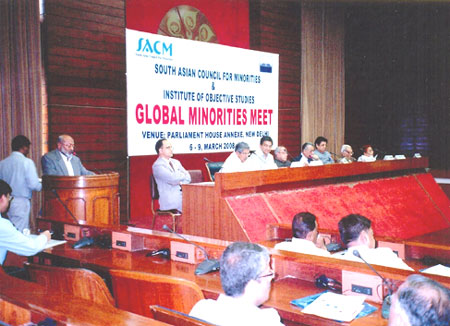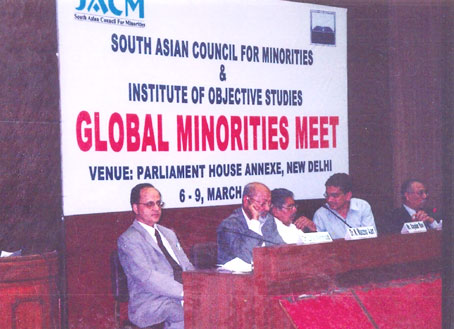|
GLOBAL MINORITIES MEET
Orgnised by
South Asian Council for Minorities &
Institute of Objective Studies
March 6-9, 2008
Venue: Parliament House Annexe, New Delhi
|
|

L-R: Dr. M. Manzoor Alam, Chairman IOS (Speaking), Dr. Zafar Mahmood, Mr. Vayalar Ravi, Minister of Overseas Indian Affairs, Mr. Naved Hamid, Mr. Parnab Mukherjee, Minister of External Affairs, Mr. Justice A. M. Ahmadi, Former Chief Justice of India, Mr. E. Ahmad, Minister of State for External Affairs, Justice Rajinder Sachar and Dr. Nimala Deshpandey, M.P.
New Delhi, March 9: Jointly organised by South Asian Council of Minorities and Institute of Objective Studies, the conference attracted participants from Britain, Uganda, Sri Lanka, Pakistan and Bangladesh. Prof. K. Hampton of Britain’s School of Law and Social Sciences said issues of minorities was a global concern. People working for minorities rights should exchange ideas and experiences with people working in this field in different parts of the world. Uganda’s Fredrik Mosisi, Bangladesh’s Misbah Kamal and Sri Lanka’s Raza Yahya spoke on problems confronted by their communities. Mr Hasanul Haque of Bangladesh observed there was little change in the situation of minorities in the sub-continent.
|
|
|
Dr Abusaleh Shariff, who was secretary on Sachar Committee Report, said the situation of Muslim minority in India was completely different from minorities in Europe, Africa and other places. Muslims in India were not immigrants. They were part of the warp and woof of the Indian society. “Forming an equal opportunity commission in light of Sachar Committee recommendations would certainly solve the problems of discrimination against Muslims”, he observed.
The concluding session was presided by noted educationist Ahmad Rasheed Sherwani. Chairman Delhi Minorities Commission Mr Kamal Farouqi, Chairman Institute of Objective Studies Dr Mohammad Manzoor Alam, and Convenor South Asian Council of Minorities Mr Nawaid Hamid addressed the gathering.
The resolution condemned all sorts of discrimination against minorities anywhere in the world and urged the governments of different countries, including India, to protect human rights of minorities and give them space to grow and prosper as was enshrined in the Charter of the United Nations.

L-R: Dr. Zafar Mahmood, Dr. M. Manzoor Alam, Chairman (IOS), Mr. Vayalar Ravi, Minister of Overseas Indian Affairs, Mr. Naved Hamid and Justice A. M. Ahmadi, Former Chief Justice of India
Union Minister of State for Food Processing Industries Mr Subodh Kant Sahai said recommendations of Sachar Committee to address social, educational and economic concerns of Muslims should be implemented in toto. Speaking at global minorities meet here on March 7, he said the Sachar Report painted a grim picture of the Muslim community, and contradicted the popular belief that Muslims were being appeased. The meet was jointly organised by South Asian Council for Minorities and Institute of Objective Studies.
The first session of the four-day conference was inaugurated by Minister for External Affairs Mr Pranab Mukherjee. It was addressed by Minister for Non Resident Indians Mr Vayalar Ravi, Union Minister of State for External Affairs Mr E. Ahmad, former Chief Justice of India Justice A.M. Ahmadi, former Chief Justice of Delhi High Court Justice Rajindar Sachar, Member of Parliament Mrs Nirmala Deshpande. Chairman Institute of Objective Studies gave welcome address.
Mr Nabeer Singh Siddhu, a Sikh leader from the US, said Sikhs had to face a lot of trouble as well as social and political discrimination in the US. “Sikhs did not participate in social and political affairs. And Americans did not know much about the community.” But, Mr Siddhu said, the situation was changing. The going was no longer tough. Mr Ramesh Mal, a representative of backward Hindus in Pakistan, spoke on “Ethnic Violence: Role of State Machinery and Security of Minorities”. Mr Mal said backward Hindus were suffering two types of oppression. Pakistan’s majority community ignored them as they were Hindus and upper caste Hindus were exploiting them on social plains.
|
|
|
|
|
|
|